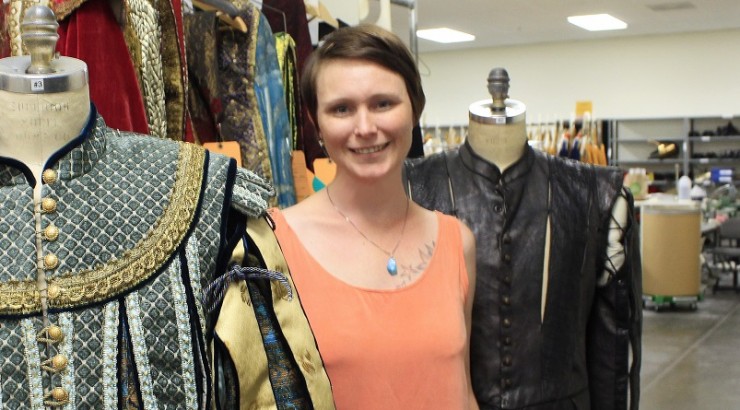
The Perfect Stitch: Laina Babb ’04 tailors costumes for world-famous opera shows
May 27, 2015
Laina Babb, BFA theatre and dance ’04, has rocketed to the head of tailoring at the Los Angeles Opera after remarkable hard work and dedication — a work ethic molded in her exciting years at Chapman. In this Alumni Spotlight questionnaire, Laina tells us about her fascinating experience using her costume and design talents in the opera, including tales of working alongside Placido Domingo, the world-famous director of the Los Angeles Opera.
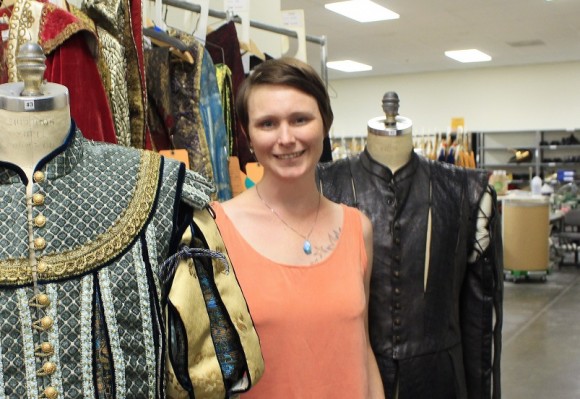 Tell us about your career. What’s a day in the life of head of tailoring at the Los Angeles Opera like?
Tell us about your career. What’s a day in the life of head of tailoring at the Los Angeles Opera like?
Tailoring is a very specific technical side of costume and clothing construction. It’s couture in truest sense of the word. Each piece is made specifically to the artists’ unique measurements, much of the structure is hand-stitched and each tailor has his or her own tricks of the trade. As head of tailoring, I run a team of at least four tailors and stitchers, and for every season of the opera, our team is in charge of men’s costumes for five-to-seven opera shows. That can include principle singers, chorus men, dancers, supernumeraries and actors. In a new production, I’m in charge of working with the costume designers to produce the patterns based on the designers’ sketches, choosing the process in which we as a team will build the pieces, fit the performers, and attend all dress rehearsals to work through problems you don’t see till they are all on stage. A lot of the time, we do remounts or rentals. In that case, we have the difficult task of taking something made for someone else and altering it to look like it was made for one of our performers.
How did you get involved in tailoring and the opera scene?
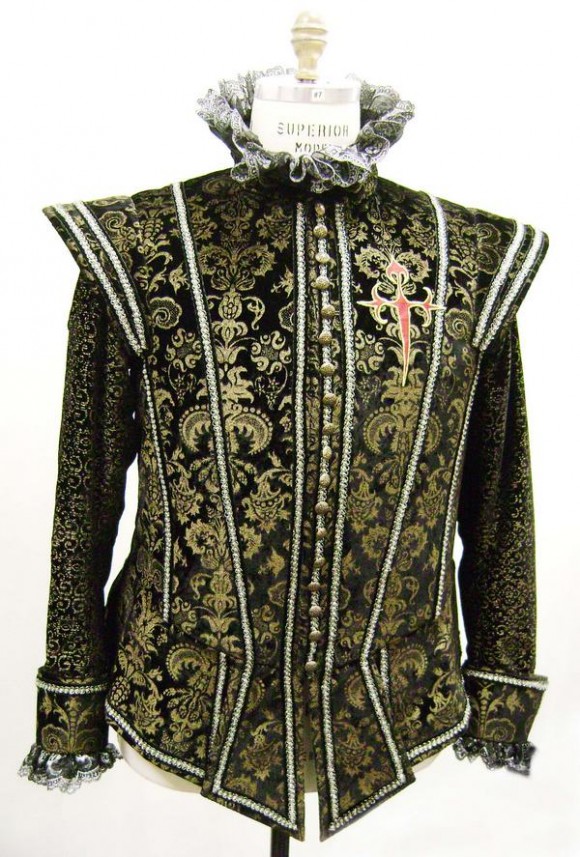
I did two summer internships at Central City Opera in the mountains of Colorado. My first summer was in between my junior and senior year, and then the summer after my graduation. I’d never worked in opera before, but found the design and over-the-top production value of it to be challenging and rewarding. I returned to Los Angeles and applied at the Los Angeles Opera and a month later I was hired as an over-hire stitcher. I must have done something right because I was hired on full-time as a stitcher for the rest of the 2004-2005 season. Since then, I worked my way up, learned as much as I could whenever I could, and eight promotions later, I was offered this top-skilled management position.
Do you have any stories about interesting or especially difficult projects you’ve worked on?
I’ve been privileged to be a part of so many amazing productions, and I work with so many amazingly talented people. I get to work with our company director, Placido Domingo, on a regular basis. I’ll never forget the first time I heard him warming up in his dressing room before a dress rehearsal and thinking how lucky I was to get to hear the top opera singer in the world in such a setting,
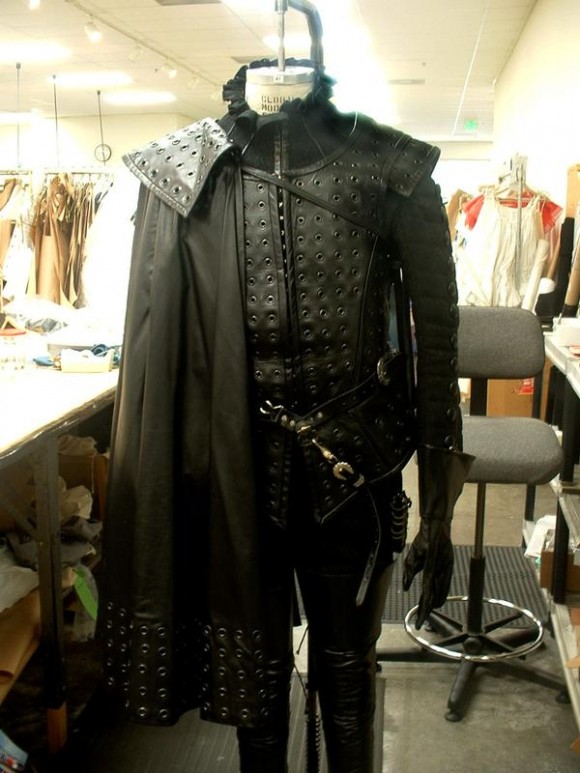
One of the most over-the-top productions I’ve done was Wagner’s
The Ring Cycle
. This was a four-part opera done over three seasons. But we were actually working on it for two years leading up the first production, so it was a five-year process for us. The costumes ranged from padded mussel suits, a flying baby dragon and numerous dwarf costumes, where we had to engineer costumes to make people as tall as 6’2″ look miniature.
What insight would you give to current students and alumni who are pursuing a career in theatre and the arts?
First of all, you have to truly love it. I know people say that all the time and you’re tired of hearing it, but it really is true. The arts can be hard with long hours, stressful schedules and big personalities. Overall, I would say it’s most important to stay professional. A lot of people get the wrong idea that because it’s artistic, the rules change somehow. But it’s a job and you have to be just as dedicated and punctual. Your next job will probably come from someone you worked with in the past, so always put your best self forward.
What advice do you have for current students who want to make the most out of their time at Chapman?
I think it can be too easy to settle into your major and spend most of your time just around others in that same major. Try and get outside of that a little, take a class just because you’re interested in the subject, not because you need it or it’s in your track. I ended up taking a number of history classes just because they peaked my interest, and by my junior year I ended up adding it as my minor since I only needed two more classes to accomplish that.
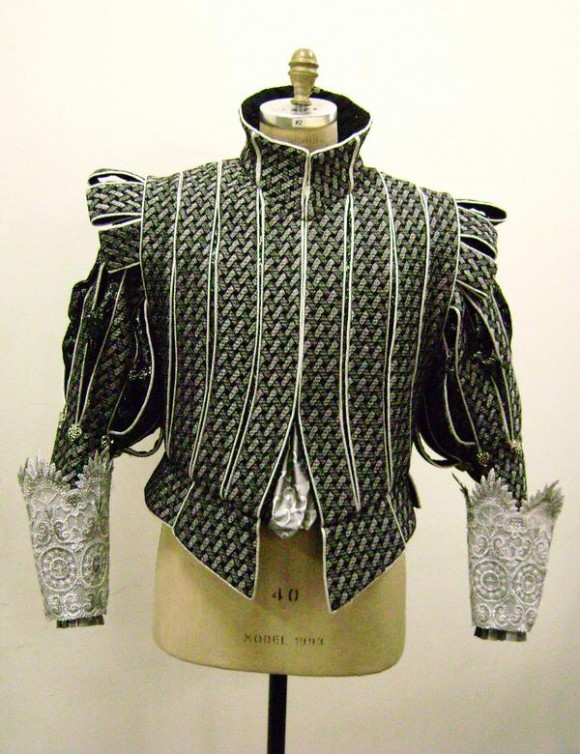 From your time at Chapman, which faculty member(s) made the greatest impact on you and why?
From your time at Chapman, which faculty member(s) made the greatest impact on you and why?
I worked in the costume shop as work study for all four years. I learned so much from Pat Cavins, who ran the shop. She always pushed me to try more, always had my back when I was up against a hard deadline, and overall made time there pleasant and fulfilling. She’s the one who encouraged me to apply to internships over the summer break.
Then of course there was Professor Slayton in the history department. I looked forward to his classes more than any other class I took. He had a way of engaging the class that made you excited to learn more. I also enjoyed how he taught through stories, not just facts. It got you thinking and gave me a love of research that has helped me immensely in my career.
How has your Chapman degree helped you in your professional and personal life?
Between my job in the costume shop and a number of theatre and film productions I was part of, I left Chapman with an already-substantial resume. This put me in a great position when it came to job searching, and my strong references put me ahead of a number of other candidates. Then of course there are a number of my close friends I met during my time there.
How were you involved on campus during your time as a Chapman student?
Although I never joined any clubs, I found myself heavily involved in the productions of student films. Once people found out I could sew, there really seemed to be no end to the production jobs I was offered. Lots of weekends, lots of late, late nights and totally worth it!
What is your favorite Chapman memory?
During interterm, I took advantage of one of the travel classes. I went on a tour of China with the history department. We went to the Great Wall, saw the Terracotta Soldiers, wandered through beautiful gardens, and saw amazing shows of dance, music and acrobatics.
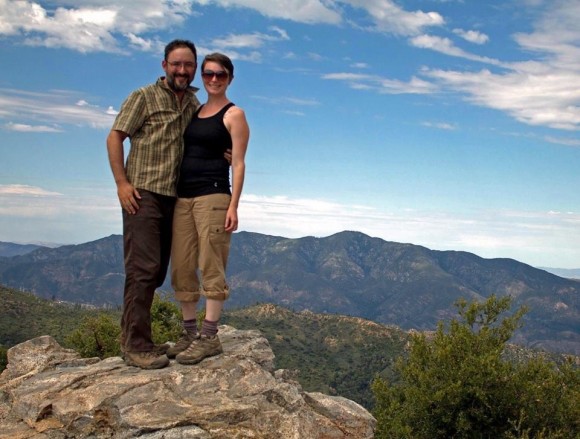
But back stateside, I’d have to say trying to learn to play pool in the dorms. We had no idea what we were doing and most nights just ended up taking pictures to look like we were good at it. We didn’t have Facebook (or even Myspace) back during our freshman year so the photos were more for us than anything else. I’m still bad at pool, and I still like taking pictures during it!
What was your favorite spot on campus as a student?
The campus has changed so much since I left — I don’t think many of my favorite places are still around. I loved watching the Disney fireworks from the sunken lawn. It was filled in at some point and is probably called something else now. I’ll also always have a soft spot for the old dorms that are long gone by now. I lived in Cheverton; it was a two-story building with a courtyard setting. With the rooms opening into an open space, it made it a very social place. Met a lot of good people, made a lot of good memories.
Have you been involved with Chapman since graduating?
Not directly, but it can definitely feel like it sometimes. There are three or more of our regular chorus members that are fellow alumni. A super we work with from time-to-time has a daughter who attends Chapman. And yet another fellow Panther will be a principle singer this season in
Magic Flute
.
Is there anything else you’d like to share with the Chapman Family?
Besides my job, I try and get out of L.A. as much as possible and explore what else California has to offer. Camping and hiking have taken over as my top pastime, which is great because sewing was for so long. I find it best to diversify my life and keep trying new things.
Explore and Connect Further:
-
Want to be featured in a blog like this, on social media or in Chapman Magazine? Share your news with us »
-
Want to catch up with alumni friends? Attend our next event »
-
Want to get involved with your alma mater? Volunteer with us or join an alumni group »
-
Who doesn’t like a good deal? Check out your alumni benefits and discounts »
-
Want to receive the monthly alumni e-newsletter and stay connected with Chapman? Make sure we have your current contact info »